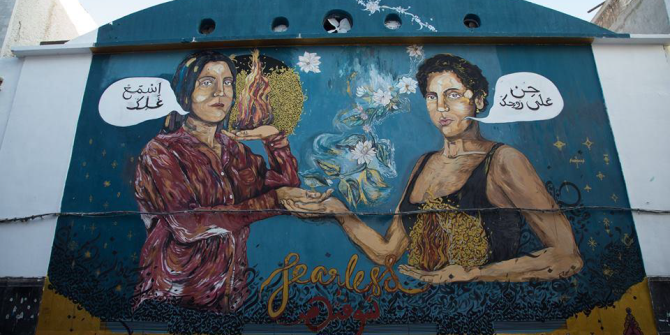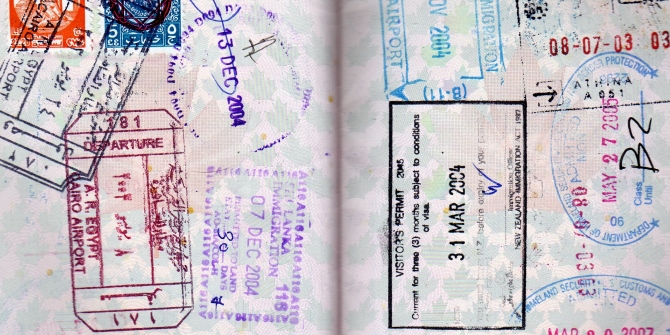by Elan Schwarz and Brianna Gomez

Blog by Elan Schwarz and Brianna Gomez based on a presentation by Solange Valdez-Symonds (Project for the Registration of Children as British Citizens) at an LSE workshop on ‘Preventing Statelessness among Migrants in North Africa’ held on 1 March 2019.
Migration is one of the most pressing issues of our time. Asylum seekers, refugees, and economic migrants have an almost fixed spot in media coverage and academia. Unfortunately, the same cannot be said for statelessness.
Rarely is the problem of statelessness looked at outside of the context of the “developing world”. The Project for the Registration of Children as British Citizens (PRCBC) highlights the complexities of the UK nationality system, and explains how it has developed in a way that seriously contributes to the creation and subsequent maintenance of statelessness in the UK.
Birth registration law in England in Wales dictates that a child must be registered within 42 days of birth. A similar requirement will apply to abandoned newborns found by informants, with a 42-day deadline to register a newborn after being found. While the government’s website confirms this information, it does not warn the public that failure to register a child’s birth is a summary offence, carrying a penalty fine of £200. Ms Valdez-Symonds mentioned that she only became aware of this penalty after consulting the criminal, birth, and register Acts directly – something one would not expect those outside the legal profession to do.
While there are no official records of how many births go unregistered, it is estimated by Her Majesty’s Passport Office (HMPO), that each year approximately 20 births are not being registered within the first 12 months (excluding those born outside of health service delivery). This figure seems to suggest that birth registration is effectively regulated in the UK. The issue at stake is not the lack of birth registration in the UK per se; rather, it is the dissociation of birth registration from legal identity, and consequently, legal status. National guidelines issued by the Home Office state that UK birth certificates are “evidence of an event” of birth, and not evidence of an ‘individual’s (legal) identity’. British nationality law does not confer citizenship merely by birth.
Before 1 January 1983, any person born in the UK (other than a small list of exemptions such as children born to diplomats) acquired citizenship at birth. The UK brought an end to birthright citizenship, however, with the British Nationality Act of 1981 (BNA). Following the passing of the Act, children who are born in the UK are only deemed British if one of their parents is British or “settled” in the UK during the time of their birth. Ending birthright citizenship introduced the risk that children would be born and grow up in the UK without citizenship. This was a controversial step. In response to the concern expressed at the end of centuries of practice, several provisions were introduced by Parliament under the BNA to mitigate the potential damage caused by the termination of birthright citizenship.
Firstly, abandoned newborns are treated as born in the UK, and thereby acquire British citizenship. Curiously, there is no statutory definition as to what “newborn” means in terms of age. Secondly, a special provision was introduced under the 1981 Act in recognition of the fact that the end of birthright as citizenship would increase the number of stateless children. The UN Convention on the Reduction of Statelessness requires States to either confer citizenship on everyone born on their territory (as the UK did prior to 1983) or to permit anyone born stateless on their territory to be registered as a citizen if they fulfil certain criteria, which the Convention permits the State to adopt. The 1981 Act includes provision to satisfy this second alternative. In order to reduce statelessness, the children born in the UK who are stateless at birth and who continue to be stateless are provided an entitlement to register. This right to registration is limited to persons under the age of 22, who have completed 5 years of continuous residence in the UK without being absent for more than 450 days. Thirdly, children born in the UK to migrant parent(s) who then become “settled” or acquire British citizenship, have an entitlement to register as a British citizen. Lastly, a person born in the UK and who has lived in the UK during the first 10 years since their birth has an entitlement to register, so long as they can provide evidence of this.
These provisions are intended to ensure that children with a very strong connection to the UK are given the right to become British citizens, and in theory provide a legal framework ensuring that statelessness can be avoided. But, just as highlighted by the LSE’s research on North Africa, there are still many obstacles preventing children from asserting their right to citizenship. The foremost issue is the lack of public awareness – either that people are not British merely by birth in the UK or of the legal right to register as a citizen such as in the circumstances mentioned above. Due to the inadequate amount of information sharing, many children and adults have no status despite having been born in the UK. To make matters worse, even if a person is aware of their legal right, they may not be able to access it because of the steep registration fee, ranging from £1,012-£1,206. All children, including stateless children, are expected to pay this fee in order to pursue the citizenship claims they are entitled to under law. It should be noted that over and above administration costs, the fee includes a profit-making amount of over £600. The introduction of the Legal Aid, Sentencing and Punishment of Offenders Act (LASPO) in 2013 has cut funding for any legal aid towards the assistance or advice in registration applications. It is possible to apply for exceptional case funding but this can take time and there are specific requirements to be met in order to stand a chance of this being granted. Furthermore, it is poorly remunerated.
Solange Valdez-Symonds and her work with the Project for the Registration of Children as British Citizens (PRCBC) strive to break down the barriers in place so that children are able to exercise their right to register as British. The PRCBC’s efforts include raising awareness of the issue through means such as monthly advice programs, assisting affected youth through the provision of legal advice and legal aid, providing training to assisting organisations, and extensive legal research in this area.
Entitlement to citizenship is an absolutely essential right because it affords one all of the other protections and advantages we often take for granted as citizens, such as access to education, loans, voting, property ownership, health and social services, the right to pass on citizenship to your children and of course, the right to remain in the country of origin or to return should you leave. Importantly also, citizenship forms an integral part of one’s identity and feeling of belonging within one’s country of residence and its political community. Under international law, each individual has a right to a nationality, yet, as Ms Valdez-Symonds points out, this right will go unfulfilled if states do not acknowledge their corresponding duty to provide nationality to those who escape the purview of their domestic legal system.
We urge the UK government to increase public education, transparency, and legal support for citizenship rights in order to end its complicity in the practice of creating stateless individuals. Without question, there need to be better protection and support mechanisms in place so that people do not fall through the cracks of the law and become at risk of statelessness.

Solange Valdez-Symonds is a Director at PRCBC and practicing solicitor. In 2012, Valdez-Symonds established the Project for the Registration of Children as British Citizens (PRCBC) after discovering a gap in UK law concerning the protection of children’s rights and citizenship. She tweets at @solange_valdez
 Elan Schwarz is a Senior Editor for the LSE Human Rights Blog, and is particularly interested in studying and writing about the intersection of technology and human rights. Prior to studying at LSE, she graduated from McGill University where she studied philosophy and anthropology. She has also completed the Foundation Year Programme at King’s University in Halifax.
Elan Schwarz is a Senior Editor for the LSE Human Rights Blog, and is particularly interested in studying and writing about the intersection of technology and human rights. Prior to studying at LSE, she graduated from McGill University where she studied philosophy and anthropology. She has also completed the Foundation Year Programme at King’s University in Halifax.
 Brianna Gomez‘s interests lie in the legal protections and durable solutions for refugees and asylum seekers. Most recently her career path took her to Cairo, Egypt where she worked as a Resettlement Legal Advisor for Saint Andrews Refugee Service (StARS). Prior to that experience she worked as an Immigration Paralegal in Boston, USA, representing primarily Central American asylum seekers.
Brianna Gomez‘s interests lie in the legal protections and durable solutions for refugees and asylum seekers. Most recently her career path took her to Cairo, Egypt where she worked as a Resettlement Legal Advisor for Saint Andrews Refugee Service (StARS). Prior to that experience she worked as an Immigration Paralegal in Boston, USA, representing primarily Central American asylum seekers.
This blog post and the others in the series are based on presentations during a workshop convened by the MEC on 1 March 2019 discussing statelessness and legal identity in the context of migration. @BronwenManby
In this series:
- Preventing Statelessness among Migrants in North Africa and their Children: Birth registration and ‘legal identity’ by Bronwen Manby
- State Obligation to Establish Legal Identity in Comparative Perspective by Alenka Prvinšek Persoglio
- Civil Registration and Legal Identity in Humanitarian Settings by Ann Livingston
- Preventing Statelessness among Undocumented Migrants: The role of the International Organization for Migration by Anne Althaus & Laura Parker
- From Birth Registration to Confirmation of Citizenship: Is the UK process the model to aspire to? by Elan Schwarz and Brianna Gomez
- What is the Fuss over the UN’s Global Compact for Safe, Orderly and Regular Migration? by Elspeth Guild
- When Identity Documents and Registration Produce Exclusion: Lessons from Rohingya Experiences in Myanmar by Natalie Brinham
- Consular Protection, Legal Identity and Migrants’ Rights: Time for Convergence? by Stefanie Grant
- Obstacles to Accessing Civil Registration and Identification: NRC’s Field Experiences with Displaced Persons by Fernando de Medina-Rosales
- Defining Identity and Identifying Migrants in the Global Compact for Migration by Tendayi Bloom






